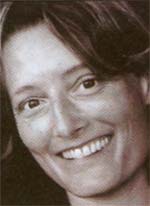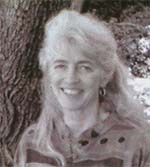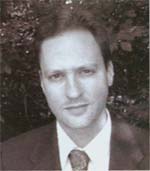 Amy Schmidt’s article on practicing with trauma, coauthored with Dr. John J. Miller, appears here. She tells us, “Like many trauma survivors, I spent lots of time believing that I was a hopeless yogi because I couldn’t get beyond the emotional turmoil. When I became the resident teacher at Insight Meditation Society, I was able to see behind the scenes of retreats, and I realized there were others working with trauma in their meditation practice. We wrote this article so that meditators with trauma histories can realize they aren’t alone. Also, I believe such meditators have special needs in terms of practices, and I feel it’s important that students and teachers alike are aware of these needs.”
Amy Schmidt’s article on practicing with trauma, coauthored with Dr. John J. Miller, appears here. She tells us, “Like many trauma survivors, I spent lots of time believing that I was a hopeless yogi because I couldn’t get beyond the emotional turmoil. When I became the resident teacher at Insight Meditation Society, I was able to see behind the scenes of retreats, and I realized there were others working with trauma in their meditation practice. We wrote this article so that meditators with trauma histories can realize they aren’t alone. Also, I believe such meditators have special needs in terms of practices, and I feel it’s important that students and teachers alike are aware of these needs.”
 Susan Moon (“Ten Practices to Change the World,”) writes, “I’ve been a peace activist for many years, and carrying on in spite of despair is always an issue. This is a scary time in our country. I’ve been alive in other scary times as well, but this administration takes the cake. In the process of writing this article to encourage others to become active, I myself was encouraged as I discovered how many progressive Buddhists and fellow travelers are already vigorously working for change in this country.
Susan Moon (“Ten Practices to Change the World,”) writes, “I’ve been a peace activist for many years, and carrying on in spite of despair is always an issue. This is a scary time in our country. I’ve been alive in other scary times as well, but this administration takes the cake. In the process of writing this article to encourage others to become active, I myself was encouraged as I discovered how many progressive Buddhists and fellow travelers are already vigorously working for change in this country.
Bodhisattvas, disguised as ordinary humans, are out there, working to liberate beings, and we can join them. There are two parts of my practice as a Zen student: sitting down on the cushion, and getting up. This is about the getting up part.”
 In her article, Diana Winston, founder of the Buddhist Alliance for Social Engagement, outlines seven ways to overcome knee-jerk cynicism about politicians. She tells us, “This is one of those teach what you have to learn’ articles. Without a doubt, learning how notto create enemies is a challenging aspect of practice for me, especially in these times. Fortunately, I plug away at it, doing my best to put my own principles into practice, and not always successfully. This article grows out of my ongoing life’s work: linking dharma practice and action for the sake of the world. Currently, I’m focusing on teaching and training activists, youth, and dharma practitioners in both meditation and spiritually grounded compassionate action.”
In her article, Diana Winston, founder of the Buddhist Alliance for Social Engagement, outlines seven ways to overcome knee-jerk cynicism about politicians. She tells us, “This is one of those teach what you have to learn’ articles. Without a doubt, learning how notto create enemies is a challenging aspect of practice for me, especially in these times. Fortunately, I plug away at it, doing my best to put my own principles into practice, and not always successfully. This article grows out of my ongoing life’s work: linking dharma practice and action for the sake of the world. Currently, I’m focusing on teaching and training activists, youth, and dharma practitioners in both meditation and spiritually grounded compassionate action.”
 Eric M. Zsebenyi, whose “Ancestors” piece on Edward Conze appears here, explains his initial interest in this iconoclastic Buddhist scholar: “I came across Conze’s writing as an undergraduate in religious studies at Naropa Institute, and they were one of the main inspirations that prompted me to pursue a master’s degree in Buddhist studies. When one of my professors at Naropa loaned me a copy of his memoirs, I was blown away. I thought, ‘This guy is the Hunter S. Thompson of Buddhology!’ As I proceeded to read through his many publications, I was struck by the combination of devotion, rigor, and exuberance that Conze brought to his work. I began to do research in order to satisfy my curiosity, and along the way I found that others like me are interested in knowing more about this irascible mahasattva. I decided it would be fitting to pay him tribute on this, the twenty-fifth anniversary of his death.”
Eric M. Zsebenyi, whose “Ancestors” piece on Edward Conze appears here, explains his initial interest in this iconoclastic Buddhist scholar: “I came across Conze’s writing as an undergraduate in religious studies at Naropa Institute, and they were one of the main inspirations that prompted me to pursue a master’s degree in Buddhist studies. When one of my professors at Naropa loaned me a copy of his memoirs, I was blown away. I thought, ‘This guy is the Hunter S. Thompson of Buddhology!’ As I proceeded to read through his many publications, I was struck by the combination of devotion, rigor, and exuberance that Conze brought to his work. I began to do research in order to satisfy my curiosity, and along the way I found that others like me are interested in knowing more about this irascible mahasattva. I decided it would be fitting to pay him tribute on this, the twenty-fifth anniversary of his death.”